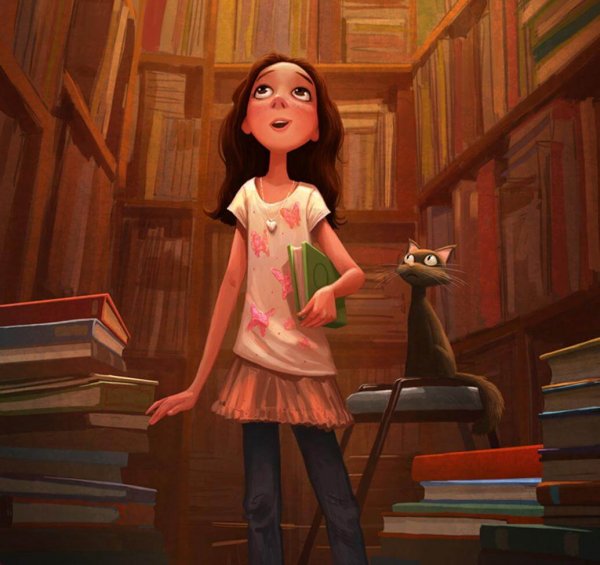We Are What We Eat, But We Are Also The Books We Read


Written and verified by the psychologist Valeria Sabater
We are what we eat, there’s no doubt, but we are also each book we read. People are made up of everything they have gone through in life and also everything in each story they read, their characters, their battles, their majestic universes.
Jorge Luis Borges said that paradise would be something like a large and infinite library. It’s an idyllic image that everyone who participates in the healthy exercise of reading daily would agree on. It feeds us and allows us to move forward, to learn and in turn, to be a little more free.
To say therefore that people are also every book they read is not an exaggeration. In that part of our mind where we store our childhood memories we also find those books that, somehow, drew a line in our lives between the before and the after. We will rarely experience such intensity, joy and delight as we did when we read those books.
This early incursion into the world of fantasy, the forests of mystery, and the seas of adventures is embedded word by word and image by image into the deepest recesses of our brain. It determines, in large part, who we are today. Therefore, a big part of us is made up of things we maybe have never seen with our eyes but rather felt with our hearts. Journeys we’ve gone on in our minds.

The books in your brain
A study published in the Journal of Business Administration confirmed a piece of data that we all take for granted but unfortunately, don’t always do. College students who’ve been reading ever since childhood have much higher scores in critical thinking, creativity, reflection, metacognition and written expression. However, something that is being seen today is that our young people today read, but don’t do “deep reading”.
Deep reading is defined as a delicate, slow process whereby we immerse ourselves completely in what we’re reading. No hurry, no external pressure. It is this exceptional ability to “become one” with the book by capturing the richness of the text. When decoding words does something to us on a sensory and emotional level.
Through deep reading we also capture the details of the text. We enjoy the narrative and the skill of the writer. However, here is the most interesting part. Experts explain that this type of reading sets off an amazing process in our brain: it synchronizes. The brain centers associated with speech, vision and hearing are synchronized in deep reading.

- Broca’s area, which is responsible for perceiving rhythm and syntax, is intensely activated.
- Wernicke area is also activated, which is related to our perception of words and their meaning.
- The angular gyrus, which regulates perception and language use, also experiences greater interconnectivity.
All these processes and many more create sensations and emotions that leave a permanent imprint in our brain.
Books in a world of distracted minds
According to an interesting article published in The New York Times, over the past year sales of books for adults fell by 10.3%. Children’s book sales, meanwhile, fell by 2.1%. In turn, electronic book sales fell much more, almost 21.8%. However, digital audio books sales increased by 35.3% and to our surprise, it continues to rise.
For psychologists, the reason behind this phenomenon of preferring to “have the book read to me” rather than doing it ourselves is obvious. Our minds are distracted; we need to do many things at once. Check our cell phone, update social media, have coffee, look at the TV, read our emails…
In turn, there is another small detail that Stephen King recently pointed out: people have lost the pleasure of turning the pages of a book. Now we just put it in our ears so our hands are free to use our cell phone. This is probably why he wrote his novel, “Cell.”
All this means that in recent months, sales of audio books have gone up so much. They are perfect for multitasking, because you can just put in your earbuds and have your eyes and hands free for multitasking. It’s seemingly “perfect” but unfortunately sad.

We are losing the pleasure of deep reading, and some of our children will deprived of the delight of immersing themselves in a physical book the traditional way: turning the pages, one by one, in big, dusty library or the intimate light under the covers.
We are what we eat, there’s no doubt, but we are also each book we read. People are made up of everything they have gone through in life and also everything in each story they read, their characters, their battles, their majestic universes.
Jorge Luis Borges said that paradise would be something like a large and infinite library. It’s an idyllic image that everyone who participates in the healthy exercise of reading daily would agree on. It feeds us and allows us to move forward, to learn and in turn, to be a little more free.
To say therefore that people are also every book they read is not an exaggeration. In that part of our mind where we store our childhood memories we also find those books that, somehow, drew a line in our lives between the before and the after. We will rarely experience such intensity, joy and delight as we did when we read those books.
This early incursion into the world of fantasy, the forests of mystery, and the seas of adventures is embedded word by word and image by image into the deepest recesses of our brain. It determines, in large part, who we are today. Therefore, a big part of us is made up of things we maybe have never seen with our eyes but rather felt with our hearts. Journeys we’ve gone on in our minds.

The books in your brain
A study published in the Journal of Business Administration confirmed a piece of data that we all take for granted but unfortunately, don’t always do. College students who’ve been reading ever since childhood have much higher scores in critical thinking, creativity, reflection, metacognition and written expression. However, something that is being seen today is that our young people today read, but don’t do “deep reading”.
Deep reading is defined as a delicate, slow process whereby we immerse ourselves completely in what we’re reading. No hurry, no external pressure. It is this exceptional ability to “become one” with the book by capturing the richness of the text. When decoding words does something to us on a sensory and emotional level.
Through deep reading we also capture the details of the text. We enjoy the narrative and the skill of the writer. However, here is the most interesting part. Experts explain that this type of reading sets off an amazing process in our brain: it synchronizes. The brain centers associated with speech, vision and hearing are synchronized in deep reading.

- Broca’s area, which is responsible for perceiving rhythm and syntax, is intensely activated.
- Wernicke area is also activated, which is related to our perception of words and their meaning.
- The angular gyrus, which regulates perception and language use, also experiences greater interconnectivity.
All these processes and many more create sensations and emotions that leave a permanent imprint in our brain.
Books in a world of distracted minds
According to an interesting article published in The New York Times, over the past year sales of books for adults fell by 10.3%. Children’s book sales, meanwhile, fell by 2.1%. In turn, electronic book sales fell much more, almost 21.8%. However, digital audio books sales increased by 35.3% and to our surprise, it continues to rise.
For psychologists, the reason behind this phenomenon of preferring to “have the book read to me” rather than doing it ourselves is obvious. Our minds are distracted; we need to do many things at once. Check our cell phone, update social media, have coffee, look at the TV, read our emails…
In turn, there is another small detail that Stephen King recently pointed out: people have lost the pleasure of turning the pages of a book. Now we just put it in our ears so our hands are free to use our cell phone. This is probably why he wrote his novel, “Cell.”
All this means that in recent months, sales of audio books have gone up so much. They are perfect for multitasking, because you can just put in your earbuds and have your eyes and hands free for multitasking. It’s seemingly “perfect” but unfortunately sad.

We are losing the pleasure of deep reading, and some of our children will deprived of the delight of immersing themselves in a physical book the traditional way: turning the pages, one by one, in big, dusty library or the intimate light under the covers.
This text is provided for informational purposes only and does not replace consultation with a professional. If in doubt, consult your specialist.







